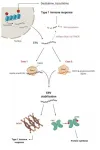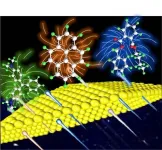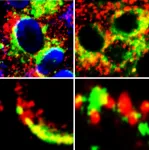(Press-News.org) The chemotherapy drug decitabine is commonly used to treat patients with blood cancers, but its response rate is somewhat low. Researchers have now identified why this is the case, opening the door to more personalized cancer therapies for those with these types of cancers, and perhaps further afield.
Researchers have identified the genetic and molecular mechanisms within cells that make the chemotherapy drug decitabine--used to treat patients with myelodysplastic syndrome (MDS) and acute myeloid leukemia (AML) --work for some patients but not others. The findings should assist clinicians in developing more patient-specific treatment strategies.
The findings were published in the Proceedings of the National Academies of Science on March 30.
The chemotherapy drug decitabine, also known by its brand name Dacogen, works by modifying our DNA that in turn switches on genes that stop the cancer cells from growing and replicating. However, decitabine's response rate is somewhat low (showing improvement in just 30-35% of patients), which leaves something of a mystery as to why it works well for some patients but not for others. To find out why this happens, researchers from the KAIST investigated the molecular mediators that are involved with regulating the effects of the drug.
Decitabine works to activate the production of endogenous retroviruses (ERVs), which in turn induces an immune response. ERVs are viruses that long ago inserted dormant copies of themselves into the human genome. Decitabine in essence, 'reactivates' these viral elements and produces double-stranded RNAs (dsRNAs) that the immune system views as a foreign body.
"However, the mechanisms involved in this process, in particular how production and transport of these ERV dsRNAs were regulated within the cell were understudied," said corresponding author Yoosik Kim, professor in the Department of Chemical and Biomolecular Engineering at KAIST.
"So to explain why decitabine works in some patients but not others, we investigated what these molecular mechanisms were," added Kim.
To do so, the researchers used image-based RNA interference (RNAi) screening. This is a relatively new technique in which specific sequences within a genome are knocked out of action or "downregulated." Large-scale screening, which can be performed in cultured cells or within live organisms, works to investigate the function of different genes. The KAIST researchers collaborated with the Institut Pasteur Korea to analyze the effect of downregulating genes that recognize ERV dsRNAs and could be involved in the cellular response to decitabine.
From these initial screening results, they performed an even more detailed downregulation screening analysis. Through the screening, they were able to identify two particular gene sequences involved in the production of an RNA-binding protein called Staufen1 and the production of a strand of RNA that does not in turn produce any proteins called TINCR that play a key regulatory role in response to the drug. Staufen1 binds directly to dsRNAs and stabilizes them in concert with the TINCR.
If a patient is not producing sufficient Staufen1 and TINCR, then the dsRNA viral mimics quickly degrade before the immune system can spot them. And, crucially for cancer therapy, this means that patients with lower expression (activation) of these sequences will show inferior response to decitabine. Indeed, the researchers confirmed that MDS/AML patients with low Staufen1 and TINCR expression did not benefit from decitabine therapy.
"We can now isolate patients who will not benefit from the therapy and direct them to a different type of therapy," said first author Yongsuk Ku, also with the KAIST Department of Chemical and Biomolecular Engineering. "This serves as an important step toward developing a patient-specific treatment cancer strategy."
As the researchers used patient samples taken from bone marrow, the next step will be to try to develop a testing method that can identify the problem from just blood samples, which are much easier to acquire from patients.
The team plans to investigate if the analysis can be extended to patients with solid tumors in addition to those with blood cancers.
INFORMATION:
-About KAIST
KAIST is the first and top science and technology university in Korea. KAIST was established in 1971 by the Korean government to educate scientists and engineers committed to the industrialization and economic growth of Korea.
Since then, KAIST and its 64,739 graduates have been the gateway to advanced science and technology, innovation, and entrepreneurship. KAIST has emerged as one of the most innovative universities with more than 10,000 students enrolled in five colleges and seven schools including 1,039 international students from 90 countries.
Recently, Professor YANG Liangbao, from the Institute of Health and Medical Technology, Hefei Institutes of Physical Science (HFIPS), developed a general surface-enhanced Raman spectroscopy (SERS) method for actively capturing target molecules in small gaps based on nano-capillary pumping model. Relevant results were detailed in the Journal of the American Chemical Society.
SERS is a spectroscopic technique typically used to determine vibrational modes of molecules. It's commonly used in chemistry to provide a structural fingerprint by which molecules can be identified.
In this research, using the principle of capillary suction, they constructed ...
Talk of a graduate student mental health crisis is abundant in academic and popular media, but a University of Otago study has found no evidence of one in New Zealand.
The study, published in Frontiers in Psychology, used data from the Graduate Longitudinal Study New Zealand to compare the mental wellbeing of students who did, and did not, transition into PhD study after completing their undergraduate degree.
Co-author Dr Damian Scarf, from the Department of Psychology, says the researchers found poor mental health is not an inevitable consequence of PhD study in New Zealand.
This is despite ...
ATLANTA - MAY 24, 2021 - A new study underscores the importance of health insurance coverage continuity in access to and receipt of care and care affordability in the United States. Researchers found that health insurance coverage disruptions were consistently associated with worse healthcare access and problems with care affordability. The study appears in the American Journal of Preventive Medicine.
Decades of research has demonstrated that health insurance coverage is associated with better access to care and health outcomes in the U.S. However, less research has addressed coverage disruptions ...
A strange phenomenon happens with modern blue whales, humpback whales and gray whales: they have teeth in the womb but are born toothless. Replacing the teeth is baleen, a series of plates composed of thin, hair- and fingernail-like structures growing from the roof of their mouths that act as a sieve for filter feeding small fish and tiny shrimp-like krill.
The disappearing embryonic teeth are testament to an evolutionary history from ancient whales that had teeth and consumed larger prey. Modern baleen whales on the other hand use their fringed baleen ...
The swift development of vaccines has provided a vital tool to combat the spread of the deadly SARS-CoV-2 virus, but challenges to reaching herd immunity posed by the rise of new mutations and the inability of immunosuppressed people to develop an effective immune response following vaccination point to a need for additional solutions to maximize protection.
A new USC study published in the Journal of Biological Chemistry reveals how therapies targeting a molecular chaperone called GRP78 might offer additional protection against COVID-19 and other coronaviruses that emerge in the future.
Chaperones like GRP78 are molecules that help regulate the correct folding of proteins, especially when a cell is under ...
Reduced levels of a metabolic hormone known as leptin is linked to poor vaccine antibody responses in the general population, a University of Queensland study has found.
The researchers made the discovery while investigating several cohorts' responses to the influenza vaccine or hepatitis B vaccine pre-COVID.
UQ's Professor Di Yu identified a link between the metabolic and immune systems that could be used to develop new strategies for improving vaccine protection in vulnerable populations.
"Using multiple advanced techniques in immunology, genetics ...
Women taking 1,000 mg of docosohexanoic acid (DHA) daily in the last half of pregnancy had a lower rate of early preterm birth than women who took the standard 200 mg dose, according to a study funded by the National Institutes of Health. Women who entered the study with the lowest DHA level had the greatest reduction in early preterm birth, which is birth before 34 weeks of pregnancy and which increases the risk of infant death and disability
The study was conducted by Susan E. Carlson, Ph.D., at the University of Kansas Medical Center, Kansas City, and colleagues. It appears in EClinicalMedicine. Funding was provided by NIH's Eunice Kennedy Shriver National ...
Among the powerful biochemicals of the human immune system, peptides are one of the best.
Most commonly found in the places where microbes love to take root - mucous membranes of the eye, mouth, nose and lungs - they're known to kill all sorts of tiny invaders, such as viruses, bacteria and fungi.
Given their power, one might think peptides would represent promising drug treatments, perhaps even a cure, for many infectious diseases. But, alas, they are fundamentally flawed: They are vulnerable to a myriad of enzymes whose job is to rapidly break them down in a way that robs them of their therapeutic properties.
"Because of their vulnerability to enzymatic breakdown, ...
A clinical study led by Linköping University and financed by pharmaceuticals company Diamyd Medical has investigated whether immunotherapy against type 1 diabetes can preserve the body's own production of insulin. The results suggest that injection of a protein, GAD, into lymph nodes can be effective in a subgroup of individuals. The results have been published in Diabetes Care.
In type 1 diabetes, the body's immune system attacks the cells that produce insulin. When the insulin-producing cells have disappeared, the body can no longer regulate blood sugar level, and a person with type 1 diabetes must take exogenous ...
Regular, standardized assessments of evacuation shelters can help keep people healthy following natural disasters, according to research published by Tohoku University scientists and colleagues in the journal Heliyon. The study found that a clean tap water supply and hygienic toilets were especially important for protecting evacuees from the spread of infectious diseases.
"A clean water supply and maintaining hygiene are important for reducing environmental health risks among victims of natural disasters," says Tadashi Ishii, who specializes in disaster medicine at Tohoku University. "But scientists have
not yet established a strong evidence base that describes the relationship between damage in resource supplies and infrastructure ...




